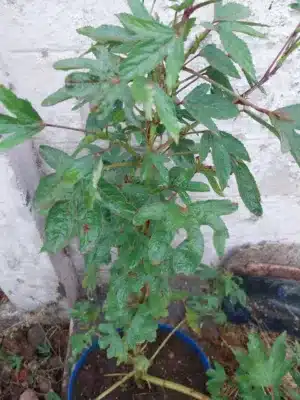Roselle Leaves - Unveiling the Nutritional Magic and Health Benefits - A Medicinal Marvel
Gongura or pulicha keerai in Tamil & Kudrum in Hindi. But actually Pulicha Keerai is Tamil name for for Sorrel. If I am wrong please correct me..
Table of Contents


Origin
Roselle: A Globally Cherished Plant with Tropical Origins
Roselle, scientifically known as “Hibiscus sabdariffa”, is a plant with a rich history and a global presence, likely originating from the tropical regions of West Africa. It encompasses two primary varieties: *H. sabdariffa* variety altissima, primarily cultivated for its fibrous properties, and *H. sabdariffa* variety sabdariffa, cherished for the edible outer portion of its flower, known as the calyx.
The plant’s journey through time and across continents is a testament to its enduring appeal. It was already well-established in the West Indies by the early 16th century and had found its way to Asia by the 17th century. Known by various names, such as Asian Sour leaf, in Indonesia and Australia, Hibiscus leaves in Malaysia, and Labog and Guragod in the Philippines, Roselle’s versatility extends beyond its vibrant, ruby-colored calyces. The leaves, recognized as a nutritional green, can be enjoyed both raw and cooked, enriching diets with their unique flavors and nutrients.
While it may have originated from India to Malaysia, it has traveled far and wide, becoming a common and cherished crop in many tropical and subtropical regions across the globe. Its adaptability and the diverse ways in which it is embraced in culinary traditions highlight its significance as a plant with deep roots in history and a bright future in global agriculture and cuisine.
Nutrients
Nutrients
Nutrient-Rich: Roselle leaf is packed with vital nutrients, including vitamin C, antioxidants, calcium, iron, and fiber.
Immune Support: The high vitamin C content in Roselle Kudrum leaf leaves contributes to a strengthened immune system, helping the body fend off illnesses.
Bone Health: Calcium from leaf supports bone health, making it a valuable addition to a well-rounded diet.
Iron Boost: Incorporating its leaves can help maintain healthy iron levels, essential for carrying oxygen throughout the body.
Digestive Aid: The fiber content in Roselle leaf promotes digestive health, aiding in proper digestion and preventing constipation.
Versatile Culinary Ingredient: Beyond nutrition, Kudrum leaf is versatile in the kitchen, elevating dishes with its unique flavor profile.
Natural Remedy Potential: Traditionally, Roselle leaf has been used in natural remedies, showcasing its potential health benefits beyond basic nutrition.
A Wealth of Other Nutrients: Beyond these key nutrients these leaves offer a bounty of additional healthful elements, including B vitamins, magnesium, calcium, and iron. In Southeast Asia, they are utilized to craft tonics that soothe sore throats, act as diuretics, and even provide topical relief for skin issues like cracks, ulcers, and boils.
Embracing the goodness of its leaves in your diet can be a flavorful and nutritious choice, providing a natural remedy for digestive concerns, fortifying your immune system, and contributing to your overall health and vitality. With their robust nutritional profile, these leaves are a treasure trove of well-being waiting to be explored.
Benefits
Roselle: Beyond the Kitchen – A Medicinal Marvel
Roselle, celebrated for its culinary charm, extends its influence far beyond the dining table. The roselle flower and plant have long been regarded for their remarkable medicinal properties, offering an array of potential health benefits:
Traditional Healing: In various cultures, roselle is believed to hold the key to addressing an array of health concerns. It’s considered a potential remedy for high blood pressure, wound healing, ulcers, and even colds. In some corners of the world, roselle juice is employed in the treatment of conjunctivitis.
Nutrient-Rich Treasure: Beyond its culinary allure, the roselle plant is a storehouse of essential vitamins and minerals. It boasts an impressive lineup, including Vitamin A, Vitamin B1 (thiamin), Vitamin B2 (Riboflavin), Vitamin B9 (folic acid), and Vitamin C. Additionally, its leaves, stem, and flowers are rich in critical minerals like calcium, potassium, magnesium, and iron.
Digestive Health: Roselle has earned its place as a digestive ally. It is known for its potential in preventing digestive tract issues, such as constipation, diarrhea, bloating, and irritable bowel syndrome (IBS). It nurtures gut health and promotes overall digestive well-being.
Immune System Support: The leaves contribute to a strengthened immune system through their provision of vitamin C, helping to reduce inflammation in the body.
Organ Functionality: With a supply of vitamin A, Roselle leaves support and maintain healthy functioning of various organs within the body.
Fluid Balance: The presence of potassium in Roselle leaves aids in balancing fluid levels, contributing to overall hydration and well-being.
Nutrient Boost: Roselle leaves provide a spectrum of essential nutrients, including B vitamins, magnesium, calcium, and iron, offering a holistic nutritional benefit to the body.
Holistic Wellness: In European countries, roselle has gained popularity for its holistic health benefits. It’s cherished for managing hangovers, regulating blood pressure, reducing cholesterol levels, and protecting the liver.
Cancer Prevention: The leaves of the roselle plant are believed to possess cancer-fighting potential. Chlorophyll and carotenoids found in roselle are thought to contribute to the prevention of conditions like breast cancer.
Skin Care: Roselle’s dried leaves are a versatile resource in skincare. They are used in treating ringworms, alleviating itching, and creating face packs that help prevent wrinkles and tighten the skin.
Diuretic and Purgative: Regular consumption of roselle leaves, stems, and flowers can aid in flushing toxins from the body. Their diuretic and purgative properties contribute to detoxification and overall well-being.
Traditional Remedies: In Southeast Asia, Roselle leaves are utilized to create tonics for soothing sore throats, acting as a diuretic for fluid balance, and applied topically to alleviate skin issues such as cracks, ulcers, and boils.
From pickle to stew and even innovative creations like Roselle Biriyani, this versatile plant finds its way into a myriad of recipes. It joins forces with mutton for a delectable curry and makes for a tasty addition to various dishes. Embracing roselle in your diet, whether as a culinary delight or a natural remedy, can be a flavorful journey toward holistic wellness.
